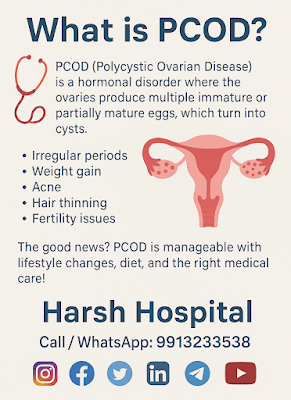 |
| Risks of Poorly Controlled Asthma in Pregnancy |
“Risks of Poorly Controlled Asthma in Pregnancy”
By Dr. Hitesh A. Patel – Harsh Hospital, Himatnagar
🌬️ Introduction
Asthma is one of the most common chronic respiratory conditions affecting women of reproductive age. During pregnancy, asthma can become more complex due to physiological changes, increased oxygen demand, and hormonal influences. Poorly controlled asthma in pregnancy is not just a danger to the mother—it can significantly impact fetal growth and pregnancy outcomes.
At Harsh Hospital, Himatnagar, under the expert care of Dr. Hitesh A. Patel, we emphasize proactive asthma control as an essential part of antenatal care.
📌 Why Is Asthma Management Important During Pregnancy?
Asthma affects the airways and limits the oxygen supply to the lungs. During pregnancy, the baby depends entirely on the mother's oxygen supply for its development. Poor asthma control can reduce oxygen levels, which may lead to complications for both mother and baby.
⚠️ Risks of Poorly Controlled Asthma in Pregnancy:
For the Mother:
-
Increased risk of preeclampsia
-
Frequent hospital admissions
-
Higher chance of respiratory infections
-
Fatigue and reduced physical activity
-
Emergency C-section risk
For the Baby:
-
Low birth weight
-
Preterm birth (before 37 weeks)
-
Fetal growth restriction (FGR)
-
Stillbirth (rare, but higher in severe uncontrolled cases)
-
Neonatal respiratory distress
🤰 What Triggers Worsening Asthma During Pregnancy?
-
Exposure to dust, smoke, pollen, or pet dander
-
Viral infections like the common cold or flu
-
Acid reflux (GERD), which is more common during pregnancy
-
Stress and anxiety
-
Certain medications without doctor’s consultation
-
Discontinuing asthma inhalers out of fear
🛑 Many pregnant women stop their asthma medications fearing harm to the baby—but uncontrolled asthma is more dangerous than most well-prescribed asthma treatments.
✅ How to Manage Asthma Safely During Pregnancy
1. Continue Your Medications
-
Inhaled corticosteroids and bronchodilators are generally safe.
-
Always take medications as prescribed.
2. Regular Antenatal Check-Ups
-
Schedule frequent visits to monitor oxygen saturation, fetal growth, and maternal lung function.
3. Avoid Known Triggers
-
Keep your environment clean and allergen-free.
-
Avoid perfumes, incense, and strong cleaning agents.
4. Monitor Your Breathing
-
Use a peak flow meter if advised by your doctor.
-
Track any worsening symptoms promptly.
5. Vaccination
-
Get vaccinated for flu and COVID-19 (as per government guidelines) to prevent respiratory complications.
6. Nutrition & Rest
-
Eat iron-rich and anti-inflammatory foods.
-
Stay hydrated and sleep well.
👨⚕️ Expert Antenatal Support at Harsh Hospital, Himatnagar
Dr. Hitesh A. Patel specializes in high-risk pregnancies, including those complicated by asthma, thyroid disease, hypertension, and diabetes. At Harsh Hospital, we offer:
-
Personalized asthma and pregnancy management
-
On-site sonography and lung health monitoring
-
Emergency care and delivery support
-
Patient counseling and breathing techniques
“With the right care, most women with asthma can have a perfectly healthy pregnancy and a safe delivery.”
— Dr. Hitesh A. Patel
🏥 Visit Us for Safe & Expert Pregnancy Care
📍 Harsh Hospital, Himatnagar
📞 Call or WhatsApp: 9913233538
🗓️ Monday–Saturday | 10 AM – 1 PM & 5 PM – 8 PM
Asthma in pregnancy needs attention—but it’s manageable. Never stop medications without consulting your doctor. Regular check-ups, healthy habits, and early warning signs can make all the difference in ensuring a safe pregnancy and a healthy baby.
Trust Harsh Hospital – Where Every Breath Counts, For You & Your Baby.
🔖 Tags (for SEO & Search):
#AsthmaInPregnancy #PregnancyRisks #HarshHospital #DrHiteshPatel #HimatnagarHospital #HighRiskPregnancyCare #MaternityCare #MotherAndChildHealth #BreatheEasyPregnancy









